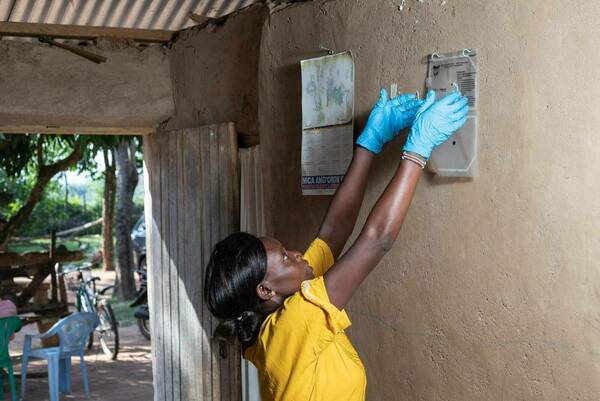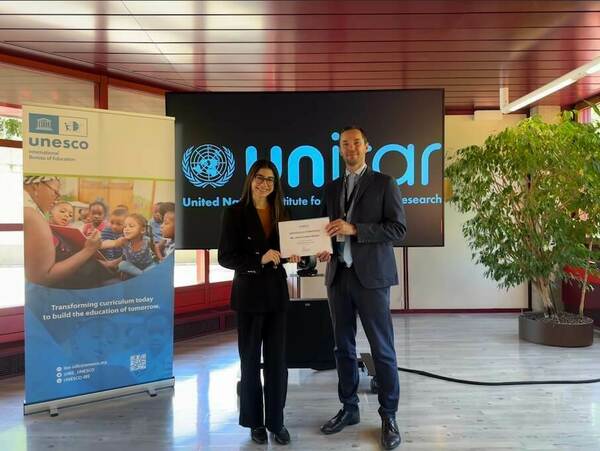Notre Dame research informs WHO conditional recommendation for spatial repellents in malaria vector control

The World Health Organization (WHO) recently announced a “conditional recommendation” for spatial emanators, also known as “spatial repellents,” in the fight against malaria. This key determination was informed by spatial repellent studies that included the Advancing Evidence for the Global Implementation of Spatial Repellents (AEGIS) Project in Kenya, led by the University of Notre Dame and funded by Unitaid. The findings from this particular study were recently published in The Lancet.
Spatial repellents hung in interior spaces emit an active ingredient into the air that can affect mosquitoes in different ways, depending on the dose of the chemical. This includes killing mosquitoes, deterring them from entering treated spaces, and/or preventing them from finding humans to bite. Any one or a combination of these behaviors reduces mosquito biting, which is required to transmit pathogens that cause disease.
According to the findings from the AEGIS Project in Kenya, the rate of first-time malaria infections was one-third less for homes with the collective use of insecticide-treated bed nets and spatial repellents, when compared to homes with insecticide-treated bed nets and the placebo spatial repellent product. The AEGIS project was funded by the global health organization Unitaid and led by Notre Dame, with support for the Kenya trial from the Kenya Medical Research Institute (KEMRI) and the U.S. Centers for Disease Control and Prevention (CDC).
“We're ecstatic about this conditional recommendation by the WHO. This is a milestone for the global vector control community,” said Nicole Achee, Lead Principal Investigator and Scientific Director of the AEGIS Project at the University of Notre Dame. “It was one of the AEGIS program’s major objectives—to contribute research evidence that could improve people’s health, which aligns with Notre Dame’s mission to be ‘a powerful means for doing good’ in the world.”
Added Achee, “This conditional recommendation by the WHO opens the doors for governments to be able to procure and utilize spatial repellents for communities living in disease endemic countries. But there are still questions to be answered.” This includes the feasibility of scaling up the distribution of spatial repellents, considering factors such as affordability, distribution pathways, efficacy in different environments, and cultural acceptance. The AEGIS program has also explored these areas of need.
“Unitaid is proud to have supported the research that confirmed the promise of spatial repellents, the first new class of vector control intervention in decades. Spatial repellents open new pathways for protecting people from malaria and other mosquito-borne diseases. Our focus now is to accelerate access to ensure that these lifesaving tools reach affected communities faster,” said Dr. Philippe Duneton, Executive Director at Unitaid.
Beyond malaria, spatial repellents are also being evaluated for their potential to reduce the transmission of dengue virus and other arboviruses, for which Notre Dame has conducted trials as well. These include trials in Peru, which demonstrated protection, as well as one with the AEGIS consortium in Sri Lanka.
Neil Lobo, research professor and medical entomologist in the Department of Biological Sciences, is also pleased with this announcement. “This conditional recommendation is a super good thing. This allows countries and ministries of health to implement spatial repellents that can actually protect their people,” he said. “It is an intervention that is proven to protect people outside the scope of other recommended interventions that are present right now.” Lobo’s lab is leading new research in Bangladesh, in addition to Thailand, Cambodia, Tanzania, and Ethiopia, to assess the impact of spatial repellents on these mosquito vectors, as well as opportunities to scale up such measures.
“With funding from Notre Dame and partnerships with ministries of health, we are evaluating a spatial repellent product against dengue transmission in the urban area of Dhaka, Bangladesh, where there have been significant outbreaks of dengue,” said Lobo. “Unlike malaria, dengue is a virus, so there is no cure. We are focused on prevention.”
According to the WHO, there were an estimated 263 million malaria cases and nearly 600,000 malaria deaths in 83 countries globally in 2023. This same year, there were more than 5 million cases of dengue reported, and more than 5,000 deaths worldwide. Greater than 80 percent of these dengue cases are in the Region of the Americas, which includes all countries in North and South America, as well as all Caribbean island nations.
Speaking about the recent news, Bernard Nahlen, professor of biological sciences and director of the Eck Institute for Global Health at Notre Dame, said, “Notre Dame faculty are at the forefront of global efforts to understand and prevent vector-borne diseases. Both nationally and internationally, Notre Dame’s long-standing excellence in vector biology is recognized as indispensable to this crucial area of research.”
To learn more about infectious disease research initiatives at the Eck Institute for Global Health, please visit globalhealth.nd.edu.
###
Contact:
Damienne Jugovic, Research Communications Specialist
Notre Dame Research / University of Notre Dame
djugovic@nd.edu
research.nd.edu / @UNDResearch
About the Eck Institute for Global Health
The Eck Institute for Global Health, an integral part of Notre Dame Research, builds on the University’s historical strength in infectious disease research, including vector-borne diseases, while broadening the interdisciplinary expertise into other key global health areas including non-communicable diseases; maternal, newborn, and child health (MNCH); and global health security. The Eck Institute recognizes health as a fundamental human right and promotes research, training, and service to advance health standards and reduce health disparities, especially for those who are disproportionately impacted by preventable diseases. The Eck Institute for Global Health is training the next generation of global health researchers and leaders through undergraduate, Master of Science in Global Health, doctoral, and postdoctoral programs.
About Unitaid
Unitaid is a global health organization that saves lives by making new health products available and affordable for people in low- and middle-income countries. Unitaid works with partners to identify innovative treatments, tests and tools, help tackle the market barriers that are holding them back, and get them to the people who need them most – fast. Since Unitaid was created in 2006, the organization has unlocked access to more than 100 groundbreaking health products to help address the world’s biggest health challenges, including HIV, TB and malaria; women’s and children’s health; and pandemic prevention, preparedness and response. Every year, more than 300 million people benefit from the products Unitaid has helped roll out. Unitaid is hosted by the World Health Organization.
Originally published by at globalhealth.nd.edu on September 30, 2025.
Latest Research
- NSF Cyber SMART’s fall meeting shapes fifth year of project, legacy and future plans, and adds new memberThe U.S. National Science Foundation (NSF) Cyber SMART center gathered for its fall meeting on the University of Notre Dame campus this September. The meeting served as a checkpoint with progress reports and new projects from research leads and students…
- Slavic and Eurasian studies professor wins Humboldt fellowship to research how Russia’s religious past shapes its presentWhen Russia invaded Ukraine on Feb. 24, 2022, Sean Griffin realized his second book needed a new title. Griffin, an associate professor in the University of Notre Dame’s Department of…
- Notre Dame’s R.I.S.E. AI Conference builds interdisciplinary collaboration to inform human-centered artificial intelligenceAs artificial intelligence (AI) transforms nearly every sector of society — from healthcare and education to governance and global development — a critical question emerges: How can we conscientiously design and deploy these powerful technologies to positively impact society? This…
- University of Notre Dame joins the Global Coalition of Ukrainian StudiesThe University of Notre Dame has joined the Global Coalition of Ukrainian Studies after signing a Memorandum of Cooperation (MOC), formalized on September 24, 2025, at the Ukrainian Institute of America in New York City. Notre Dame joined four other American…
- The University of Notre Dame’s Mendoza College of Business and Industry Labs team up to inspire national security manufacturing competitiveness in the regionThe South Bend - Elkhart Region is full of manufacturing companies that are poised to grow, and Executive Master of Business Administration (EMBA) and Master of Business Administration (MBA) students at the University of Notre Dame are finding innovative ways to contribute to that growth. Earlier…
- Walking the Halls of Global GovernanceOutside the Palais…













